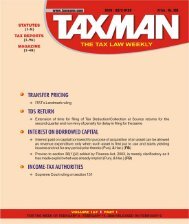CPT V24P7-Art1 (Content).pmd - Taxmann
CPT V24P7-Art1 (Content).pmd - Taxmann
CPT V24P7-Art1 (Content).pmd - Taxmann
You also want an ePaper? Increase the reach of your titles
YUMPU automatically turns print PDFs into web optimized ePapers that Google loves.
Direct Tax Laws<br />
both. The first issue, which arose, was whether<br />
the word ‘individual’ in the provision meant<br />
only the male and not the female of the species,<br />
particularly because of use of the word ‘wife’<br />
in juxtaposition ? Supreme Court held in 1950’s<br />
in the case CIT v. Sodra Devi [1957] 32 ITR 615<br />
that in section 16(3) the word ‘individual’<br />
connotes only a male, thus, granting immunity<br />
to female taxpayers from the operation of the<br />
anti-avoidance provision. This must not have<br />
been a deliberate intention of the Legislature,<br />
but only inadvertent mistake in drafting. The<br />
Legislature did not react immediately. The<br />
mistake was corrected only in the Income-tax<br />
Act, 1961, with effect from 1-4-1962, by using<br />
the word ‘spouse’ in place of ‘wife’.<br />
An interesting issue regarding applicability of<br />
clause (b) of section 16(3) arose before the<br />
Supreme Court in 1952 in the case of CIT v.<br />
Manilal Dhanji [1962] 44 ITR 876. A taxpayer,<br />
to avoid application of the above provision,<br />
settled some assets in trust for the benefit of<br />
his minor child with the direction to the trustee<br />
that the income arising from the transferred<br />
assets should be accumulated by the trustee<br />
during the minor status of the child and paid<br />
to him in a lump sum after he attains majority.<br />
The taxpayer contended before the Court that<br />
section 16(3)(b) would not be applicable as the<br />
child did not have any right to receive any<br />
income from the transferred assets during his<br />
minor status. Revenue argued that the income<br />
from the transferred assets was held by the<br />
trustee when the child was minor for his benefit,<br />
which was paid to him on attaining maturity.<br />
Supreme Court held that a person could be<br />
taxed on the income from assets transferred<br />
for the benefit of his wife or minor child,<br />
provided that in the year of account she or<br />
he derived some benefit under the transfer,<br />
either income should be received or accrued<br />
or any beneficial interest in the income acquired<br />
in the relevant year of account, and, accordingly,<br />
the provision of section 16(3) will not be<br />
applicable. Legislature did not react in this<br />
case also. The omission was corrected only in<br />
the Income-tax Act, 1961 by qualifying the<br />
630<br />
August 1 to 15, 2012 u TAXMANN’S CORPORATE PROFESSIONALS TODAY u Vol. 24 u 10<br />
word ‘transferred’ by the words ‘directly or<br />
indirectly’ and ‘benefit’ by the words ‘immediate<br />
or deferred’.<br />
Taking recourse to the provisions of the Hindu<br />
law, another tax planning exercise came into<br />
vogue. A taxpayer, to avoid the provisions of<br />
section 64 of I.T. Act, 1961, would not transfer<br />
directly or indirectly any asset to his spouse<br />
or minor children. Instead, he would throw<br />
his separate property into the common hotchpot<br />
of the Hindu undivided family consisting of<br />
himself, his wife and minor children to blend<br />
it with the H.U.F property. The property and<br />
its income would henceforth belong to the<br />
H.U.F. The H.U.F could thereafter undergo a<br />
partition of its property including the property<br />
thrown into the common hotchpot distributing<br />
it among the individual, his wife and minor<br />
children. As held by the Supreme Court in<br />
1965 in the cases of CIT v. Keshavlal Lallubhai<br />
Patel [1965] 55 ITR 637 and CIT v. M.K. Streman/<br />
Manilal Virchand [1965] 56 ITR 62, neither the<br />
act of throwing separate property by an<br />
individual in the common stock of an H.U.F<br />
of which he is a coparcener nor the subsequent<br />
partition of H.U.F property amount to transfer<br />
of property nor the provisions of section 64<br />
apply to such transactions. Here again the<br />
Legislature did not react immediately, but<br />
introduced sub-section (2) of section 64 by the<br />
Amendment Act of 1970 with effect from<br />
1-4-1971 to neutralize such tax planning<br />
undertaken after 1-1-1970.<br />
6.6 Retrospective amendments to neutralize<br />
Judicial decisions - Since 1998, there have<br />
been a large number of retrospective amendments<br />
mainly to neutralize judicial decisions of the<br />
High Courts and below, the most notable of<br />
them being introduction of section 14A with<br />
retrospective effect from 1-4-1962, which sought<br />
to neutralize the decision of the Supreme Court<br />
in the case of CIT v. Indian Bank Ltd. [1965]<br />
56 ITR 77, rendered in 1965, to the effect that<br />
in computation of taxable business income, all<br />
expenses incurred for the purpose of business<br />
should be allowable as deduction including<br />
expenditure incurred in the course of business











![“FORM NO. 3CEB [See rule 10E] Report from an ... - Taxmann](https://img.yumpu.com/45480232/1/190x245/form-no-3ceb-see-rule-10e-report-from-an-taxmann.jpg?quality=85)





